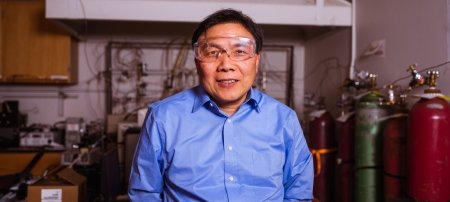Michigan Tech Tapped for State's First Center of Energy Excellence
Michigan Technological University has been selected to partner with Michigan State University and the Mascoma Corporation in Michigan’s first Center of Energy Excellence, Governor Jennifer Granholm announced at a press conference in Lansing this morning. The Center will be eligible for a $15 million grant from Michigan’s 21st Century Jobs Fund.
Michigan Tech, Michigan State and Mascoma will work with the Michigan Economic Development Corporation and J.M. Longyear—a Marquette-based company that owns more than 65,000 acres of forest land in the Upper Peninsula—to develop the state’s first commercial cellulosic ethanol plant. The plant will be located in Chippewa County, south of Sault Ste. Marie.
Cellulosic ethanol offers a clean-burning and economical alternative to petroleum-based fuel and ethanol made from corn.
"We are honored that the State of Michigan recognizes the value of our expertise in biofuels," said David D. Reed, vice president for research at Michigan Tech. "We have been exploring the frontiers of this field for some time through our Wood to Wheels research, and we look forward to working with Michigan State to support the development of Michigan's biofuels industry."
Michigan Tech will contribute its knowledge of sustainable forestry management practices and accessto its automotive engineering labs for analysis of the biofuels produced. Michigan State will provide expertise in pretreatment technology for cellulosic ethanol production and assistance with renewable energy crops that can be used by the biorefinery.
The universities will each receive an estimated $1 million to analyze issues related to the availability and cost of supplying the wood fiber and other plant materials to produce cellulosic ethanol.
Michigan is in a race with a firm in Georgia to open the first commercial-scale plant for producing cellulosic ethanol. The Massachusetts-based Mascoma Corporation announced its decision to locate in Michigan last July.
Mascoma chose Michigan because of its vast, sustainable forests and other non-food agricultural materials, as well as the research expertise available at Michigan Tech and Michigan State.
Michigan Technological University is a public research university founded in 1885 in Houghton, Michigan, and is home to more than 7,000 students from 55 countries around the world. Consistently ranked among the best universities in the country for return on investment, Michigan’s flagship technological university offers more than 120 undergraduate and graduate degree programs in science and technology, engineering, computing, forestry, business and economics, health professions, humanities, mathematics, social sciences, and the arts. The rural campus is situated just miles from Lake Superior in Michigan's Upper Peninsula, offering year-round opportunities for outdoor adventure.




Comments